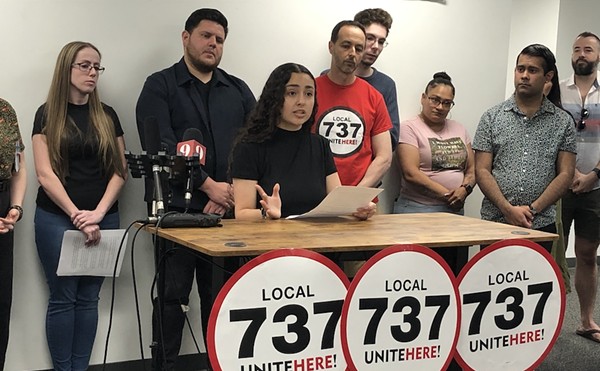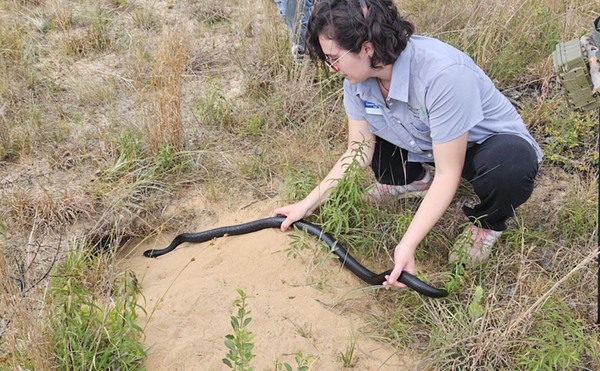Seven years ago, Lakemont Heights residents looked out their windows to see workers unraveling huge spools of cable line along streets in their east Winter Park neighborhood. Those workers were connecting the buried cable to a 371-foot radio and television tower rising from the wetlands adjacent to Lakemont Heights, a quiet cul-de-sac of 72 homes northeast of Aloma Avenue and Lakemont Drive.
Neighbors would later discover why. Time Warner Communications, the region's largest cable-television provider which last year became a subsidiary of the AOL-Time Warner empire, had purchased the tower and 11 acres surrounding it. The tower and a small adjacent utility shed would figure prominently in plans to make the Lakemont Heights site an anchor in the Time Warner network. The site now houses high-tech equipment for the company's Road Runner high-speed online service and serves more than 680,000 cable subscribers.
The company's plans meant that Lakemont Heights -- a neighborhood with only one access road that serves as entrance and exit -- would have to get used to the most visible image of the Time Warner empire: the service vehicle. According to neighbors, work trucks and vans sped through the neighborhood 24 hours a day. Trucks made loud beeping noises when backing up. Their headlights flashed through rooms late at night. Employees clanged the gates blocking the facility's driveway. Their two-way radio conversations carried through the neighborhood.
Residents knew Time Warner didn't have permission to use the tower and building the way the company was using it, because the property was zoned residential. But an exception made by Orange County in 1971, and another in 1985, let the tower be built on the condition that no workers would be stationed there.
But what could neighbors do? They had opposed the exception. They complained to Time Warner management about the traffic and noise. They confronted aggressive drivers. They filed several police reports. Yet nothing seemed to work, they said.
Things likely would have remained that way. But around Halloween, Lakemont Heights residents discovered that Time Warner was preparing to raise the stakes. The company was quietly building a new 5,000-square-foot facility and three-acre retention pond.
But how? How could Time Warner receive a permit to build an industrial facility in a residential neighborhood? Residents soon learned the county had "mistakenly" issued a building permit. A county employee had signed off on the project without realizing that what the cable giant wanted wasn't a simple addition to an already-existing building. It wanted new electrical and computer rooms, an office and nine parking spaces as the company expanded its cable TV and Internet connections to nine counties. Orange County officials corrected themselves by placing a stop order on the project Nov. 8.
When Time Warner officials complained, Orange County Zoning Department Manager Mitch Gordon sent a letter outlining a number of violations committed by the cable giant. Gordon emphasized that the Lakemont Heights facility was supposed to be unmanned. Yet the county's code-enforcement division had documented that Time Warner employees manned the facility on a daily basis. (Time Warner freely admits it employs eight workers at the site.)
Gordon noted that he could find no permit for another building Time Warner already had built. Nor had Time Warner obtained permits for the 11 satellite dishes the company had installed. Nor had they obtained proper permits for the outdoor excavation. There were other issues as well, he wrote.
Time Warner also heard an earful from residents at a Jan. 24 meeting at Lakemont Elementary School. The ostensible purpose of the meeting was for Time Warner executives to present their reasons for the 5,000-square-foot building and to allow neighbors to ask questions. But it turned into a forum for neighbors to release seven years' worth of frustration.
When Diane Pickett, Time Warner's vice president for government relations and public affairs, said the company wanted to be a good neighbor, residents asked her why the Lakemont Heights facility wasn't moved to an industrial area. When she pointed out how valuable the new facility would be to Time Warner customers, residents wanted to know what, if anything, would be done about traffic. When Pickett responded to concerns about property values by saying the new building would not be a "commercial facility," neighbors screamed, "It already is."
It was apparent at the meeting that Time Warner officials also were less than forthcoming about an alternate access road for the facility that they hoped to construct in neighboring Seminole County. Access through Seminole County is important because Time Warner is landlocked at the site by the Interlachen Country Club to the east and the Mayflower retirement community to the south. Seminole County residents wanted to know whether Time Warner was still pursuing the road.
No, Pickett said. Time Warner had "dropped the request."
In fact, Seminole County had issued a permit to build the road in April. But Development Review Manager Mahmoud R. Najda revoked the permit in November. The reason? Time Warner had planned to build the road over property it didn't own. On a Seminole County form, a Time Warner employee identified "TWC" as the property's owner. Najda says Seminole County was notified of the error by the real owner, Eric Rosoff. "Time Warner is supposed to be a reputable, credible company," Najda says. "We didn't think they would falsify information."
Such mishaps are the reason few Lakemont Heights residents are willing to give the cable company any leeway. "You've taken advantage of Orange County; you've taken advantage of citizens in this room; you've taken advantage of the whole process and added to that facility without talking to anyone," said Steve Fusilier, who lives across from the facility's entrance through a buffer of trees.
Time Warner and residents are headed for a Feb. 7 showdown in front of Orange County's Board of Zoning Adjustment, which granted Time Warner the 1971 and 1985 exceptions. Time Warner is seeking two more exceptions: to allow the 5,000-square-foot building, and to allow the company to staff it. Meanwhile, the company continues to operate as usual in Lakemont Heights -- though neighbors say there's less traffic, and workers are driving slower.
The board will weigh issues such as noise, dirt, drainage and hours of operation. But traffic, says Bruce McClendon, the county's director of growth management -- the department that erroneously issued the permit -- "is the dominant compatibility issue."
Neighbors say they want the county to uphold the earlier exceptions -- meaning no workers at the tower site.
"All the laws are on our side," says Lakemont Heights resident Carolyne Tanner.
Regardless of the outcome, county officials expect the decision to be appealed to the county commission, meaning that Commissioner Ted Edwards, whose district includes Lakemont Heights, will be on the hot seat. Other commissioners will look to him before voting whether to allow the exception. Which likely means bad news for Time Warner.
Edwards says the issue mainly comes down to commercial traffic in a residential area. "Time Warner will have to come up with a good reason why we should deviate from an unwritten policy," Edwards says.


















